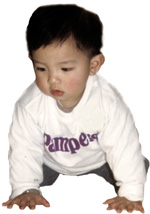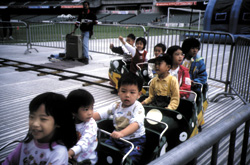 Online
Edition
Online
Edition | From
the editor Letters to the editor Milestone Answerman Periscope Campus Life Social Issues People Photo Features Education Channel Culture & Leisure Science |
| Last
Issue Archive |
| About
Varsity Advertise Media Links CUHK homepage JLM homepage |
Related
Links
Department
of Sociology, The Chinese University of Hong Kong
Also in Social Issue
Illegal
uses of public housing
![]()
Looming
crisis
Dropping fertility rate
By Natalie Yau
The fertility rate in Hong Kong is among the lowest in the world.
In fact, the rate has been decreasing steadily since 1975.
In 1975, the rate stood at 2.75; in 1996, the rate was 1.15. The figure represents the number of live births a woman will have in her lifetime.
Prof. Ting Kwok Fai is a professor in the Department of Sociology at The Chinese University of Hong Kong.
He regards the higher educational level of women as a factor in the falling rate.
Said Prof. Ting: “Because women are more educated, more of them work rather than merely stay at home.
“Office hours of 9 a.m. to 5 p.m. are history. It is common for people to work until 8 p.m. or even 10 p.m.?/font>
He said the economic downturn has also been a factor.
Payrolls have been slashed in many private enterprises. Employees have to work overtime even without compensation.
“When they return home, they are already exhausted.
“They simply lack the energy and spirit to look after children,?Prof. Ting said.
It is not easy to strike a balance between work and family.
Some people therefore delay marriage.
“Delaying marriage until after women are in their 30s is common,?said Prof. Ting.
Thus, there is less time for pregnancy before menopause.
“Also, chances of pregnancy decrease when women get older,?said Prof. Ting.
Deteriorating physical strength also hinders couples from bearing children.
He said that immense energy is needed for child rearing. Older people are less energetic.
Apart from biological and physical constraints, Prof. Ting said the delay of marriage also has an economic side.
“They may be reluctant to give up their careers for childbearing,?he said.
The change of social norms in child rearing is also influential.
People tend to treasure quality rather than quantity.
An information and communication officer at the Family Planning Association said that the traditional concept of a large family has faded.
“Child rearing is a huge investment. Parents would rather allocate more resources for their children’s education.?/font>
Prof. Ting agreed.
“Parents have higher expectations of their children now.
“To provide a bright future for their offspring, parents provide their children with extra-curriculur activities,?he said.
Improved health and hygienic conditions undoubtedly contribute to the low fertility rate as well.
In the past, with high infant mortality rate, parents had more children to increase chances that their children would survive them.
According to government statistics, the infant mortality rate was 0.40 in 1997 in Hong Kong.
The rates were 0.72 and 0.61 in 1996 in the U.S. and United Kingdom, respectively.
Prof. Ting said, ?With a low infant mortality rate, the practice of bearing more children has become outdated.?
A higher level of urbanisation also lowers fertility rates.
Limited housing is a chronic problem.
Prof. Ting said, “With a hectic lifestyle and rising costs of living, people tend to have fewer children.
“This somehow explains why Hong Kong has a lower fertility rate than the U.S..
“Many small towns in the U.S. with a slower pace of living have a generally higher fertility rate than is found in large cities."
The support of the Hong Kong government for family planning is also essential.
Prof. Ting said, “Hong Kong has done a good job in promoting birth control.?
The low fertility rate may have some adverse, long-term implications.
“An aging population is the major problem,?said Prof. Ting.
“Where there are more elderly, the government is pressured to provide more services for them.
“And the increase in dependency ratio adds a burden to the single child.?
He said that in the past, the responsibility for looking after parents was shouldered by more offspring.
“However,as there are fewer offspring per family, the responsibility of each offspring gets heavier,?he said.
“The elderly may not have enough attention and care.?
Low fertility may pose negative impacts on offspring as well.
For example, parents may impose high expectations on their children.
Moreover, as they may be the only child in the family, many of them will be spoiled.
Prof. Ting said that when they grow up, they may become weak and unable to confront difficulties independently.
Said he: “Some may even commit suicide when they are incapable to deal with a situation.
“The provision of material wealth is so sufficient that some take it for granted.?
Low fertility also reduces the labour supply.
Prof. Ting said, “With a fertility rate below the replacement level, the proportion of elderly increases and the workforce reduces in size.
“It will be alright if the economy demands talents to deal with high technology.
“Yet, if
there are many large scale infrastructure projects, there may be a lack
of workers,?said he. ![]()
|
Varsity
file photo
 |
|
Varsity
file photo
 Children today don't have as many relatives as their parents did. |